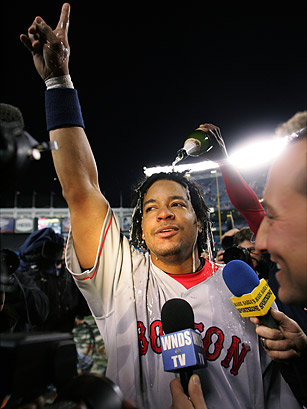
A year on, and the fierce rivals were meeting yet again in the ALCS. In the interim, in no small part due to his decision to keep starting pitcher Pedro Martinez in too long during Game 7 of the previous year's ALCS, Sox skipper Grady Little had been replaced by Terry Francona. Iconic Sox shortstop Nomar Garciaparra was traded midway through the season; this team clearly didn't care for sentiment. The new man's charges started the series in disastrous fashion, losing the first three games. The next match was surely going to put the Sox out of their (continued) misery; sure enough, Mariano Rivera entered the game in the eighth to protect a slight lead. But he gave up a hit in the bottom of the ninth, and the baseball gods started to pay (overdue) attention to Boston: pinch runner Dave Roberts dramatically stole second, from where he would eventually score to send the game into extra innings — the Mighty Mo had blown the save. The worst was to come: in the bottom of the 12th, David Ortiz's two-run walk-off home run kept the Sox on life support. The following night, it was déjà vu all over again: Rivera couldn't win the game, and Big Papi was once again the extra-innings hero. The self-described "idiots" of Boston were beginning to show they were anything but out of it.
The Sox didn't need extra innings to win Game 6. Starting pitcher Curt Schilling bravely played through the pain of a torn tendon sheath to lead the Sox to victory in what would thereafter be known as the "bloody sock game." By then, the Yankees were reeling, and with Johnny Damon hitting a grand slam early on in the winner-take-all Game 7, New York couldn't recover, and arguably the greatest choke in sports history was complete. The Sox became the first team in MLB history to lose the first three games and yet win a seven-game series. They didn't lose another game, sweeping the St. Louis Cardinals in the World Series to finally end their 86-year-long curse.